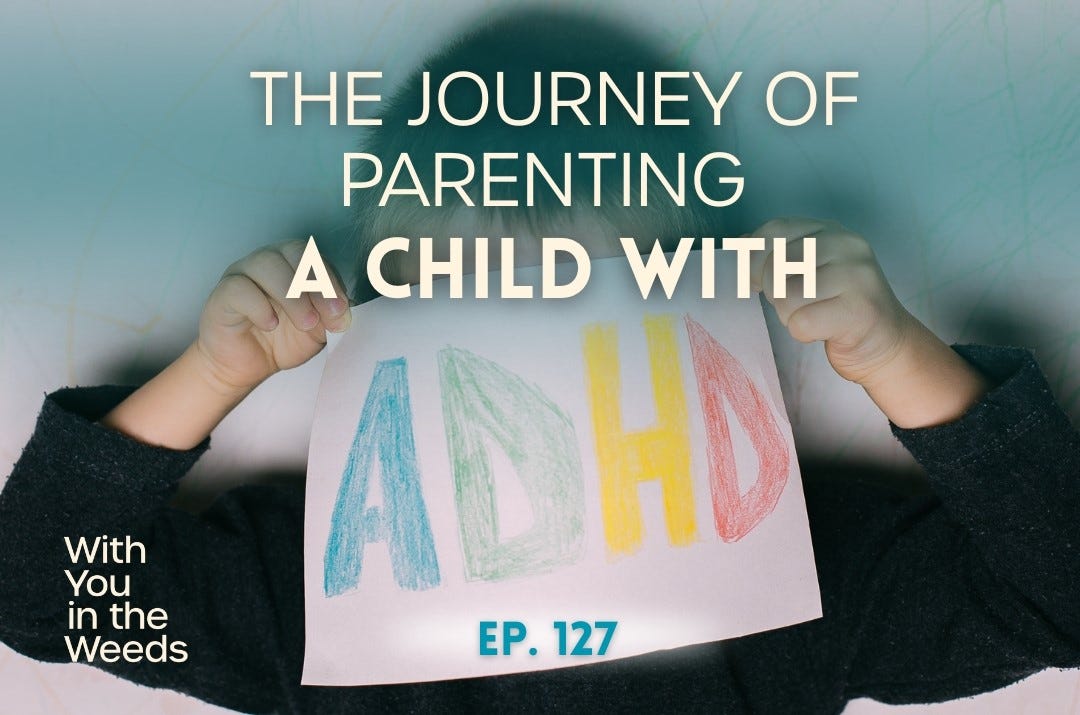The Journey of Parenting a Child with ADHD
Finding hope, support, and strategies
Facing an ADHD diagnosis for your child? While the diagnosis might come as a relief - now you know what’s wrong and how to help them - it also might be overwhelming to navigate the resources and interventions available to them. And there are difficult emotions that you need to process in order to be a supportive parent.
In this episode of our ongoing series, Parenting in the Weeds, Lynn interviews fellow WYITW co-host Austin Conner and his wife Polly about the challenging stages in the journey of parenting a child with ADHD:
Life before the diagnosis
The turning point: the diagnosis
Life after the diagnosis
As you listen to their honest insights and practical takeaways, you’ll feel a sense of validation, encouragement, and hope – and you’ll know the next steps to take on your own parenting journey.
Phase 1: Life Before the ADHD Diagnosis
As a parent who is with your child every day, it can be difficult to sort out what part of their behavior is their personality, what part is a developmental stage, and what part is the effects of your parenting.
But as the parent of a child with ADHD, you’ve probably had a few moments where you just knew that what your child is dealing with doesn’t fit into any of those categories.
Your child may need quite a bit of your help to complete their homework, regulate their emotions and behavior, and remember chores and other responsibilities. There may be times where you need to leave an event early because their behavior is out of control.
Your child might be intelligent and gifted, compassionate and sensitive, energetic and creative. But the structure of school and homework and deadlines and the personal motivation and organization that the academic system requires may be extremely difficult for them to navigate.
You may find yourself making apologies and excuses to the people around you and feel your patience wearing thin.
Over time, you realize, “Something is different here.”
Principles & Takeaways – When to Seek Professional Help
There are 4 things to look for that may indicate that outside help is needed:
Frequency: How often are behaviors/issues happening? Weekly or daily?
Severity: How severe are the issues of impulsivity and inattentiveness?
Persistence: How long do the behaviors last? Minutes/hours/days at a time
Place: Where are these showing up? A single place or multiple environments?
The Turning Point: The ADHD Diagnosis
Getting an ADHD diagnosis can bring a sense of relief that there’s a reason for the behavior you’ve been observing and trying to help your child with. It also brings a feeling of being overwhelmed with new information and new questions: Does your child need medication? What parenting changes are needed? What interventions are needed in school? What are some trustworthy resources?
You may have always felt like something was wrong with you for not enjoying every minute of time spent with your child. Now you have a root problem to address and can enlist the help of others. And you can give your child grace – their brain’s inadequate level of dopamine leads them to seek out stimulation in any way they can find it: Constant movement. Tapping. Squeezing. Screaming. Defiance.
Along with the relief and grace, you may experience grief. This is not something that will go away – and it’s probably not what you would have wanted for your child.
Along with the relief and grace, you may experience grief. This is not something that will go away – and it’s probably not what you would have wanted for your child.
Principles & Takeaways – Understanding ADHD
ADHD, or attention deficit hyperactive disorder, is characterized by difficulty paying attention and excessive movement. One common cause of ADHD is lack of dopamine production in the brain. In order to produce more dopamine, people with ADHD need to seek out stimuli and/or experiences.
While this need for incessant activity can pose challenges in school, home, and relationships, treatment is very effective when properly targeted and managed with a comprehensive, holistic approach that includes education, social support, medication, diet, exercise, and behavioral coping strategies.
If your child receives this diagnosis, there are lots of resources (see links below) that can help you educate yourself, adjust your parenting, and find the right interventions for your child.
Phase 3: Life After the ADHD Diagnosis
After working to understand ADHD with the help of educators and medical professionals, you may find that you are able to view your child’s behavior through a different lens. At each stage, they may grow out of some things but grow into new things.
Adjusting your expectations for your child – for how they plan and manage their time, regulate their emotions, and follow (or don’t follow) rules - will be crucial to helping them thrive. Your biggest adjustment may be to stop taking their disobedience personally.
ADHD may take a toll on your child’s friendships and sibling relationships as well. It’s hard to do “normal” activities as a family. Siblings often get set aside because a child with ADHD requires more attention. Be sure to intentionally plan and spend time with each sibling so that they don’t get lost in the chaos.
There will be times of grieving in order to accept this reality for your child. But you you can learn to be okay with a “new normal” as you love them for who they are, not who you want them to be.
Principles & Takeaways – Helpful Points to Consider
Perhaps you are a teacher, neighbor, church volunteer, or extended family member of parents who are dealing with an ADHD diagnosis for their child. Give them lots of grace. Make extra effort to point out the good you see in their child. Offer to give parents a break by babysitting or bringing a meal.
Be careful lending advice. Keep in mind that typical parenting doesn’t work on these kids. What worked for your kids likely won’t translate and will only frustrate the parent. Acknowledge that you see them working hard and encourage when you can.
If you are the parent in this situation, you’ll quickly realize that ADHD management is constantly changing. A medication that works for a while may stop working. Or a dosage needs to be changed either up or down.
As the child matures, they may grow out of certain behaviors, but as school and social demands increase, there may be other things they need help to deal with. Be ready to introduce new strategies as they face new challenges.
There is Hope for You and Your Child!
You’re not alone. There are so many parents out there doing their best to parent their ADHD child. If you can, find a counselor or therapist who understands. Seek out friends – even a support group – of parents who are in the same position.
Let yourself grieve. Scream into the pillow. Have a good cry. Find a safe person to vent to. There’s a temptation to gloss over or sugarcoat certain parts of parenting. But the hard days are so hard and the dark days are so dark that there’s healing and relief in acknowledging that with honesty.
God did not make a mistake by putting this child into your family. He’s got a plan, a purpose, and will walk with you through the ups, the downs, the victories, and the defeats. Remember to pray for your child and for a soft heart towards them - and know that God can and will accomplish great things in and through them - and you.
Recommended Resources
For more help navigating the weeds of ADHD, check out these books and podcasts:





